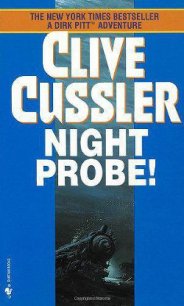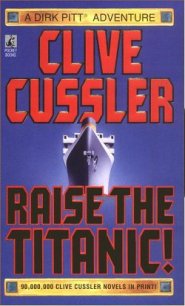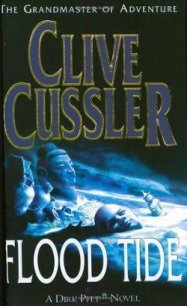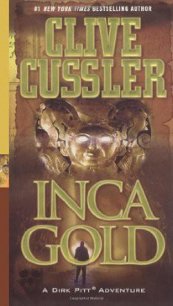Dragon - Cussler Clive (книги хорошем качестве бесплатно без регистрации .TXT) 📗
“What screwed up the abductors’ well-laid plan,” said Sandecker, “was that you men knew she was being seized and gave chase. Your alert action also confirmed the Japanese connection behind Senator Diaz’s kidnapping.”
“Whoever masterminded the separate plots was good,” Kern admitted. “Too good for the Blood Sun Brotherhood.”
“The terrorist organization,” said Pitt. “They were behind it?”
“That’s what they want us to think. The FBI received a phone call by someone who said he was a member and claiming responsibility. Strictly a red herring. We saw through the facade in less than a minute.”
“What about the helicopter that controlled the limousine?” Pitt asked. “Did you track it?”
“As far as Hampton Roads. There it blew up in midair and fell in the water. A Navy salvage team should be diving on it now.”
“A bottle of scotch they won’t find bodies.”
Kern gave Pitt a canny look. “A bet you’d probably win.”
“Any trace of the limousine that got away?”
Kern shook his head. “Not yet. It was probably hidden and abandoned after they transferred Congresswoman Smith to another vehicle.”
“Who’s in charge of the hunt?”
“The FBI. Their best field agents are already forming investigative teams and assembling all known data.”
“You think this is tied to our search into the bomb cars?” asked Giordino, who along with Pitt and Mancuso had been picked up by Kern and Sandecker a few miles from the accident site.
“It’s possible they could be warning us to lay off,” answered Kern. “But our consensus is they wanted to shut down the Senate investigating committee and eliminate the legislators who were ramrodding a bill to cut off Japanese investment in the U.S.”
Sandecker lit one of his expensive cigars after clipping the end. “The President is in a hell of a bind. As long as there’s a chance Smith and Diaz are alive, he can’t allow the abductions to leak to the news media. God knows what hell would erupt if Congress and the public found out.”
“They have us over the proverbial barrel,” Kern said grimly.
“If it isn’t the Blood Sun Brotherhood, then who?” Giordino asked as he lit a cigar he’d stolen from Admiral Sandecker’s supply in Washington.
“Only the Japanese government has the resources for an intricate abduction operation,” Pitt speculated.
“As far as we can determine,” said Kern, “Prime Minister Junshiro and his cabinet are not directly involved. Very possibly they have no idea of what’s going on behind their backs. Not a rare occurrence in Japanese politics. We suspect a highly secretive organization made up of wealthy ultranationalist industrialists and underworld leaders, who are out to expand and protect Japan’s growing economic empire as well as their own interests. Our best intelligence from Team Honda and other sources points to an extremely influential bastard by the name of Hideki Suma. Showalter is certain Suma is the kingpin behind the bomb cars.”
“A very nasty customer,” Sandecker added. “Shrewd, earthy, a brilliant operator, he’s pulled the strings behind Japanese politics for three decades.”
“And his father pulled them three decades before him,” said Kern. He turned to Mancuso. “Frank here is the expert on the Sumas. He’s compiled an extensive file on the family.”
Mancuso was sitting in a large swivel chair drinking a root beer, since no alcoholic beverages were allowed on the National Security Agency’s command bus. He looked up. “Suma, the father or the son? What do you wish to know?”
“A brief history of their organization,” answered Kern.
Mancuso took a few sips from his glass and stared at the ceiling as if arranging his thoughts. Then he began speaking as if reciting a book report to an English class.
“During the Japanese conquest of World War Two, their armies confiscated an immense hoard of loot from religious orders, banks, business corporations, and the treasuries of fallen governments. What began as a trickle from Manchuria and Korea soon became a flood as China and all of Southeast Asia, Malaya, Singapore, the Dutch East Indies, and the Philippines fell before the onslaught from the empire of the rising sun. The total of the stolen gold, gems, and priceless artifacts can only be speculated, but estimates have put it as high as two hundred billion, repeat, billion, dollars at current values.”
Sandecker shook his head. “Inconceivable.”
“The gold bullion alone was figured at over seven thousand tons.
“It all went to Japan?” asked Giordino.
“Up until nineteen forty-three. After that, American warships, and especially our submarines, interrupted the flow. Records indicate more than half of the total hoard was sent to the Philippines for inventory and forwarding to Tokyo. But toward the end of the war it was buried in secret locations around the islands and became known as ‘Yamashita’s Gold.’ “
“Where do the Sumas fit in?” Pitt inquired.
“I’m coming to them,” said Mancuso. “Japanese underworld societies quickly moved in after the occupation troops and helped themselves to the deposits in banks, national treasuries, and the wealth of private citizens, all in the name of the Emperor. Two minor agents of a criminal organization known as the Black Sky, which dominated Japan’s underworld after the turn of the century, deserted and launched their own society, naming it the ‘Gold Dragons.’ One was Korori Yoshishu. The other was Koda Suma.”
“Koda being the father of Hideki,” Sandecker concluded.
Mancuso nodded. “Yoshishu was the son of a temple carpenter in Kyoto. He was kicked out of the house by his father when he was ten. He fell in with the Black Sky and rose in its ranks. In nineteen twenty-seven, at the age of eighteen, his bosses arranged for him to join the Army, where he craftily advanced to the rank of captain by the time the Imperial Army seized Manchuria. He set up a heroin operation that brought the gang hundreds of millions of dollars that was divided with the Army.”
“Hold on,” said Giordino. “You’re saying the Japanese Army was in the drug business?”
“They ran an operation that would be the envy of the drug kings of Colombia,” Mancuso replied. “In concert with Japanese gang lords, the military ran the opium and heroin trades, forced the occupied citizenry to participate in rigged lotteries and gambling houses, and controlled the sale of black market goods.”
The bus stopped at a red light, and Pitt looked into the face of a truck driver who was trying in vain to see through the darkened windows of the bus. Pitt may have been staring out the window, but his mind followed Mancuso’s every word.
“Koda Suma was the same age as Yoshishu, the first son of an ordinary seaman in the Imperial Navy. His father forced him to enlist, but he deserted and was recruited by Black Sky mobsters. At about the same time they put Yoshishu in the Army, the gang leaders smoothed over Suma’s desertion record and had him reinstated in the Navy, only this time as an officer. Dispensing favors and money into the right hands, he quickly rose to the rank of captain. Being agents for the same criminal outfit, it was only natural that they work together. Yoshishu coordinated the heroin operations, while Suma systemized the looting and arranged shipments on board Imperial naval vessels.”
“A monumental ripoff to end all ripoffs,” Giordino observed moodily.
“The full scope of the network can never be documented.”
“More expensive even than the plunder of Europe by the Nazis?” Pitt asked, opening another bottle of soda water.
“By far,” Mancuso replied, smiling. “Then as now, the Japanese were more interested in the economic side—gold, precious gems, hard currency—while the Nazis concentrated on masterworks of art, sculpture, and rare artifacts.” His expression suddenly turned serious again. “Following the Japanese forces into China and then the rest of Southeast Asia, Yoshishu and Suma proved themselves to be archcriminal plotters. Like characters out of Heller’s book Catch-22, they worked beneficial deals with their enemies. They sold luxury goods and war materials to Chiang Kai-shek, becoming quite chummy with the generalissimo, an arrangement that paid handsome dividends after the Communists swept over China and later when the Chinese government moved to Formosa, which became Taiwan. They bought, sold, pillaged, smuggled, extorted, and murdered on an unheard-of scale, bleeding every country dry that came under their heel. It goes without saying that Suma and Yoshishu played a ‘one for you, two for me’ game when the loot was inventoried and divided with the Imperial forces.”




